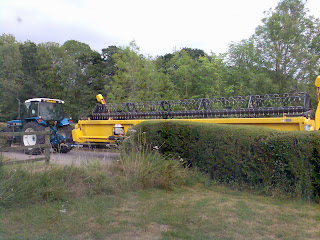A Paper by Jonathan Clatworthy, General Secretary of MCU (Modern Churchpeople's Union), about the proposed Covenant, and why it should be opposed by General Synod.The Church of England’s General Synod will soon be asked to give away an important part of its freedom in the proposed new Anglican Covenant. We hope you will vote against it.
Each province in the Anglican Communion is being asked to sign the Covenant. By signing it, they will undertake not to embark on any new development which is opposed by another Anglican province anywhere in the world, unless granted prior permission from a new international body of just 15 people, the ‘Standing Committee of the Anglican Communion’.
Who wants it?
It was first proposed in the Windsor Report of 2004, after the consecration of an openly gay bishop in the USA and the approval of a same-sex blessing service in Canada. Many wanted the provinces to be threatened with expulsion from the Anglican Communion if they did not revoke these actions and undertake never to repeat them. However, what the North Americans did was in keeping with their provincial autonomy. It would have been blatantly unjust to create new legislation forbidding these actions and then apply it retrospectively.
With expulsion impossible, the Anglican Covenant is designed to achieve a similar purpose by other means. It offers a formal structure dividing the Anglican Communion into two. Provinces which sign the Covenant would thereby make new commitments to each other. Provinces which do not sign would be treated as ‘second track’. In 2006 the Archbishop of Canterbury suggested that the relationship between the two sets of provinces would be ‘not unlike that between the Church of England and the Methodist Church’, which seems to imply that those not signing would not be considered Anglicans at all! In May 2010 he proposed that they should neither be represented in ecumenical dialogues nor be full members of the relevant committee.
Many commentators have wondered why the Archbishop of Canterbury supports the Covenant. From the day his appointment to Canterbury was announced he was the target of intense personal hostility, focusing on his perceived support for gays and lesbians. Some have speculated that his Anglo-Catholic commitments make him more concerned for the unity of the Church than for ethical matters, some that few would have resisted the ferocity of the attacks, some that any archbishop would pay a high price to resist schism. Whatever may be the case, there is now a danger that those most aware of the Covenant’s shortcomings may vote in favour of it simply in order to express solidarity with him. However, he will retire one day; but the Covenant, once signed, will remain.
Is it all about gays and lesbians?
Not any more. It was the original presenting issue, most of the rhetoric about ‘disciplining’ the North American churches has focused on it, and most of the Covenant’s supporters are primarily concerned to demote to ‘second track’ status all provinces which refuse to condemn gay and lesbian sexuality. However the wording of the Covenant does not mention the issue. Instead it proposes giving new powers to the Standing Committee to judge any new development in one province whenever another province disapproves.
This makes it a major, wide-ranging change to the Anglican Communion. We cannot foresee what changes will be needed in the next ten years, let alone the long term future, but we can be sure that new issues will indeed arise and will require new responses. Since we do not know what they will be, would it really be wise to hand an effective power of veto to opponents in the case of every new development?
How would it affect the Church of England?
If the Church signs the Covenant, every new development will be open to objection from other provinces. The objecting province (which in some cases could just be a single archbishop) will appeal to the Standing Committee. Our proposed action will then be delayed until the Standing Committee gives its verdict. The Standing Committee will have considerable freedom of judgement, but the Covenant does lay down some criteria for it. Every proposal will have to be justified by appeal to the past. The criteria will be ‘the Scriptures, the common standards of faith, and the canon laws of our churches’, rather than the traditional Anglican balance of scripture, reason and tradition which allows due place for new developments. Local needs, like the wishes of the dioceses or the British context, will be subordinated to international Anglicanism. The Communion will become more centralised and clerical, with a great deal of power vested in the Standing Committee.
The criteria for formal objections are so vague as to encourage interference by one province in another’s affairs. In effect, objectors to a proposal need only claim that they cannot in all conscience stay in the same church with it. We have already seen this claim extensively used as a negotiating tactic by opponents of the North American churches, with little sign that it does more good than harm.
Would it affect women priests and bishops?
The Covenant would not have powers to turn the clock back, and it would be difficult for objectors to block an innovation in one province which has already happened in another; so it is unlikely to hinder the introduction of women bishops. However this is only the case because some provinces already have them before the Covenant has been established. If it had been in place in 1944, the wording of the Covenant would have made it almost impossible for the Standing Committee to approve the ordination of the first woman, and the whole Anglican Communion would to this day have a male-only priesthood.
In addition many supporters of women’s ministry believe that over and above permitting women priests and bishops there is much else to be done to make the church less patriarchal and more balanced, some of which could well be liable to objections under the Covenant arrangements.
How should the Church respond to controversy?
The proposed Anglican Covenant is the product of an intolerant mindset, seeking power to veto actions it disapproves of even if they are only happening thousands of miles away.
It is not new. Reformation Puritans believed Christians should submit to the supreme authority of the Bible and therefore agree with each other on all matters of doctrine and ethics. As a matter of principle, they believed, there should be no scope for differences of opinion on doctrine and ethics. Their disagreements often provoked schism with each side accusing the other of not being true Christians. The current high profile campaigning represents a revival of this tradition.
Until now Anglicans have been better at staying united because, with our stronger emphasis on the role of reason, we accept differences of opinion as normal and expect to learn from each other. We do not expect our bishops and clergy to agree with our opinions; instead we worship together with people we disagree with, and debate our disagreements openly within the Church, rather than seeking to expel each other.
We think this more open, tolerant and inclusive theology of the Church has served Anglicanism well in the past, now needs defending against the strident tones of those who think everybody should agree with them.
To find out more
Visit http://www.modchurchunion.org/anglicancovenant/ or contact covenant@modchurchunion.org. Alternatively you can write to Covenant Debate, 9 Westward View, Liverpool L17 7EE
Jonathan Clatworthy









